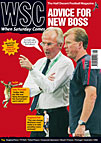 Ian Plenderleith reports on what the United States' mixed fortunes and performances mean for the future of the game in America
Ian Plenderleith reports on what the United States' mixed fortunes and performances mean for the future of the game in America
For USA fans, this was a story of serially thwarted joy. At the opening game against the Czechs, the war-lust words of The Star Spangled Banner were still hanging in the muggy evening air when they found themselves 1-0 down. After fighting back against Italy to equalise, they then had to absorb the impact of the red-card rush and were, within minutes, one man fewer instead. And hardly had they ceased screaming to celebrate Clint Dempsey’s levelling strike against Ghana, than host referee Dr Markus Merk awarded a penalty against Oguchi Onyewu for an offence as yet unrecognised by the rule book (“A remarkable call at this level,” coach Bruce Arena said diplomatically).
Dr Merk may still be able to holiday in Disneyland without fear of threats or reprisals, but a Mickey Mouse mask might also be a wise precaution. Although, as usual, most US citizens will have already forgotten the baffling decision that effectively ended the chances of a second-round tie with Brazil, there are an increasing number of football followers in the US for whom the World Cup is not just a quadrennial curiosity.
As long as the US Soccer Federation continues to turn down invitations to the Copa America, the World Cup remains the only realistic gauge by which to measure the team’s progress. Against the Czechs, they looked ordinary and unfit. Written off as the group’s whipping boys, they then turned in one of the most courageous performances in team history when holding Italy to a draw with nine men, drawing upon reserves of skill, energy and determination that had been totally lacking in the opening game. That they failed to land a shot on target was almost immaterial given how close they came to winning when DaMarcus Beasley’s shot from distance was ruled out because the lumbering Brian McBride had strayed offside.
So was this the real US team? Thanks to Ghana’s victory over the Czechs, they had one more chance to prove it. Then Claudio Reyna, of all players, ended a long and outstanding international career by uncharacteristically losing possession (while characteristically getting injured) on the edge of his own penalty area, leading to Haminu Draman’s easy goal. After that, they did well to level for the second successive game, but Dr Merk’s Amazing Invisible Penalty Show made a third comeback unlikely. With Reyna out and Landon Donovan once more creatively inert (he wasn’t “tuned in”, he admitted), the probable exit that had loomed since Jan Koller’s early header in Gelsenkirchen was realised, albeit later rather than sooner.
The run to the quarter-finals in 2002 had inflated expectations, as well as perceptions of how good the team really are. The final tally of one point and two goals, by contrast, was a harsh reflection of their perhaps just-below-average showing in arguably the toughest group. Naturally, scapegoats were needed, so TV pundit and ex-international Eric Wynalda called immediately for Arena’s dismissal, positing Jürgen Klinsmann as his replacement. Many fans and journalists followed in Wynalda’s loudmouthed wake, quickly forgetting all that the hangdog coach has achieved in eight years. The coach himself hardly looked keen to keep going (though he hardly ever looks keen to do anything besides attend a wake) and at the time of writing the consensus seemed to be that it was time for a change.
It’s easy, in retrospect, to say this was one tournament too many for veterans such as McBride and Eddie Pope. The US weren’t the only team to select experienced players or discover that the World Cup is less and less the stage for dream career finales. Beasley and Donovan, the driving force in 2002, disappointed, and only Dempsey (left out against the Czechs) and Onyewu (severely tested in the opener, but recovering superbly) gave hope for the future.
What about that future? Arena reiterated past criticisms of the youth set-up here, where Major League Soccer largely draw their players from the redundant college soccer system. Until their early twenties, these players perform in a four-month season at a level that fails to equip them mentally or technically for the professional game. A sore lack of exciting individualists remains a blight on the domestic game, too.
Whether Arena stays or not, his intelligent views on the domestic game’s development and deficiencies must be taken on board. MLS have created a 12-game reserve-league season and plan to craft a credible, solid youth system. The raucous and enthusiastic fan contingent in Germany, numbering, unprecedentedly, 15-20,000 per game, showed that they can provide support on a par with that of major footballing countries. Now it’s up to the USSF and MLS to ensure that the game’s infrastructure helps the national team follow suit.
From WSC 234 August 2006. What was happening this month